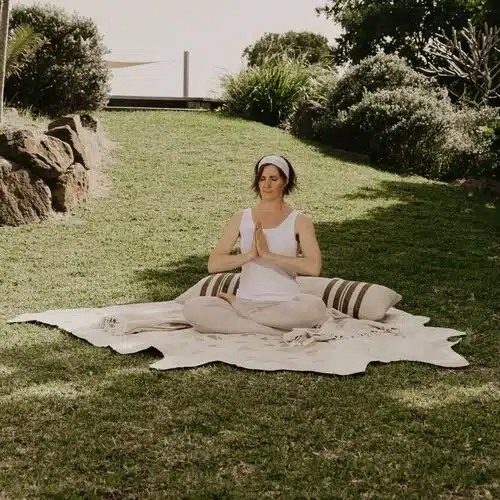The pace of today’s world has led to stress becoming a familiar companion. But by incorporating intentional practices into your daily routine, you can cultivate a sense of freedom and peace.
This blog post explores science-backed techniques to help you manage stress and nurture your mind and body. At endota, we believe everyone deserves to experience wellbeing. We focus on natural and sustainable methods to help you integrate these practices into your daily routine. Let’s explore tools to help you feel good, not just better, in the long run.
stress reduction techniques
The best approach to stress reduction often involves a combination of techniques to suit your own unique needs. Here are some powerful practices to consider:
mindfulness
Mindfulness involves paying attention to the present moment without judgement. By anchoring yourself in the present moment, you detach from worries about the future or regrets about the past. This allows your body and mind to relax, promoting a sense of calm and clarity.
This cognitive-behavioural technique activates brain regions associated with emotion regulation, attention, and memory. Pioneered by Jon Kabat-Zinn, Mindfulness-Based Stress Reduction (MBSR) is a structured program that teaches mindfulness techniques to reduce stress, anxiety, and depression. Research has demonstrated MBSR’s effectiveness in improving physical and mental health, making it a valuable tool for managing stress and promoting overall wellbeing.

meditation
Meditation is a form of mindfulness training that involves focusing your attention on a specific object, thought, or breath. Research suggests that meditation can reduce anxiety symptoms, improve focus, and enhance emotional regulation.
Meditation teaches you to observe your thoughts and feelings without getting caught up in them. This allows you to manage stress by responding calmly to challenging situations. Studies suggest that meditation can increase grey matter volume, helping rewire the brain positively, much like mindfulness.

exercise
Exercise is more than just a physical activity; it’s a potent stress reliever. Numerous studies demonstrate that physical activity boosts endorphins¹, the body’s natural mood elevators, and decreases stress hormones like cortisol. Beyond its mental wellbeing benefits, exercise also plays a crucial role in overall wellbeing. Exercise can improve mood and reduce stress by stimulating the release of endorphins.


integrating techniques for better results
The beauty of stress relief techniques is that they can be combined for even greater stress-reduction benefits. Consider starting your day with a short mindfulness meditation and a walk or yoga session. Integrating these practices into your daily routine helps create a personalised stress-management toolkit.
a stress reduction routine
The more you practise these techniques, the better you’ll be able to manage stress and cultivate a sense of calmness in your daily life. Here’s a stress-reduction routine you can adapt to suit your lifestyle:
- Morning: Start with a few minutes of mindful breathing or meditation. Enjoy a cup of calming herbal tea. Plan a short walk or yoga session into your schedule.
- Mid-day: Take a mindful break. Step away from your desk, stretch your body, and focus on slow, deep breaths.
- Evening: Unwind with a relaxing bath using an essential oil infused bubble bath and disconnect from technology for an hour before bedtime.
long-term benefits of consistent practice
By incorporating stress-reduction strategies into your daily routine, you’ll unlock a world of benefits, including:
- Increased resilience and better coping skills
- Improved sleep quality and focus
- Enhanced emotional wellbeing and overall sense of calm
more stress management tips to nurture your wellbeing
Incorporating these self-care practices can further support your journey to a calmer, more balanced life:
prioritise restorative sleep
To create a soothing bedtime routine, establish a relaxing ritual to signal to your body that it’s time to wind down. This might involve taking a warm bath, reading a book, or practising gentle stretches. Ensure your bedroom is dark, quiet, and cool for optimal sleep quality. Limit screen time before bed, as the blue light emitted from electronic devices can interfere with your sleep patterns.
nourish your body with care
To give it the nutrients it needs, nourish your body with wholesome foods, such as fruits, vegetables, whole grains, and proteins. Stay hydrated by drinking plenty of water throughout the day. To enhance your eating experience, practise mindful eating, paying attention to the tastes, textures, and sensations of your food.
connect with loved ones
Strengthen your social connections by spending quality time with friends and family. Giving back to others through acts of kindness can boost your mood and create a positive ripple effect.
Studies have shown that having strong social connections can help to buffer the negative effects of stress². Social support can provide emotional support, practical assistance, and a sense of belonging.
practise self-compassion
Self-compassion, while seemingly intuitive, has a strong scientific basis³. Studies show it activates brain regions linked to empathy, care, and social connection, reducing isolation and loneliness. It also reduces stress by lowering cortisol levels and promoting calmness.
Research indicates that self-compassion enhances self-esteem, life satisfaction, and overall happiness. So, treat yourself with kindness and compassion, just as you would a friend. Avoid self-criticism and focus on your strengths and progress.
nourish with wellness
Wellbeing encompasses both mental and physical health. Engage in wellness with a massage to relieve tension and promote relaxation. Gift a loved one a wellness experience you know they’d like, or give them the freedom to choose with an endota gift card.
return to your body's natural state
You deserve to live a calm and fulfilling life. You deserve wellbeing. By incorporating these ways to relieve stress into your daily routine, you can cultivate a greater sense of calm, balance, and resilience.
Discover our range of products designed to enhance your wellbeing. Or, visit us in spa for personalised guidance on any of our stress-relieving treatments.
sources
¹https://pmc.ncbi.nlm.nih.gov/articles/PMC4013452/
²https://www.sciencedirect.com/science/article/abs/pii/S2352250X15001554
³ Kim et al (2020) Neurophysiological and behavioural markers of compassion. Scientific Reports.

